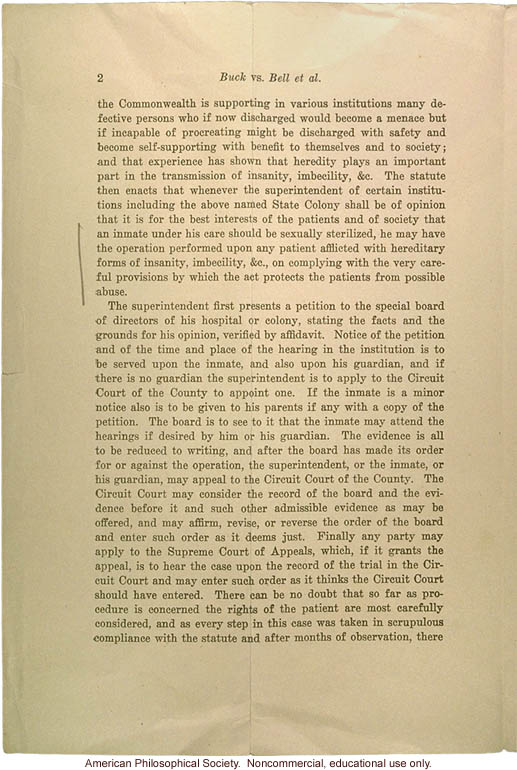Buck vs. Bell Supreme Court Decision (1)

This is the complete text of the Supreme Court opinion that upheld the legality of eugenic sterilization. The Virginia Colony for Epileptics and Feeble Minded sought to sterilize Carrie Buck, who mother and daughter were also deemed to be feebleminded. The opinion includes Justice Holmes infamous addage, "Three generations of imbeciles are enough."
261. Buck vs. Bell et al. the Commonwealth is supporting in various institutions many defective persons who if now discharged would become a menace but if incapable of procreating might be discharged with safety and become self-supporting with benefit to themselves and to society; and that experience has shown that heredity plays an important part in the transmission of insanity, imbecility, &c. The statute then enacts that whenever the superintendent of certain institutions including the above named State Colony shall be of opinion that it is for the best interests of the patients and of society that an inmate under his care should be sexually sterilized, he may have the operation performed upon any patient afflicted with hereditary forms of insanity, imbecility, &c., on complying with the very careful provisions by which the act protects the patients from possible abuse. The superintendent first presents a petition to the special board of directors of his hospital or colony, stating the fact and the grounds for his opinion, verified by affadavit. Notice of the petition and of the time and place of the hearing in the institution is to be served upon the inmate, and also upon his guardian, and if there is no guardian the superintendent is to apply to the Circuit Court of the County to appoint one. If the inmate is a minor notice also is to be given to his parents if any with a copy of the petition. The board is to see to it that the inmate may attend the hearings if desired by him or his guardian. The evidence is all to be reduced to writing, and after the board has made its order for or against the operation, the superintendent, or the inmate, or the guardian, may appeal to the Circuit Court of the County. The Circuit Court may consider the record of the board and the evidence before it and such other admissible evidence as may be offered, and may affirm, revise, or reverse the order of the board and enter such order as it deems just. Finally any party may apply to the Supreme Court of Appeals, which, if it grants the appeal, is to hear the case upon the record of the trial in the Circuit Court and may enter such order as it thinks the Circuit Court should have entered. There can be no doubt that so far as procedure is concerned the rights of the patient are most carefully considered, and as every step in this case was taken in scrupulous compliance with the statute and after months of observation, there
- ID: 10256
- Source: DNALC.EA


